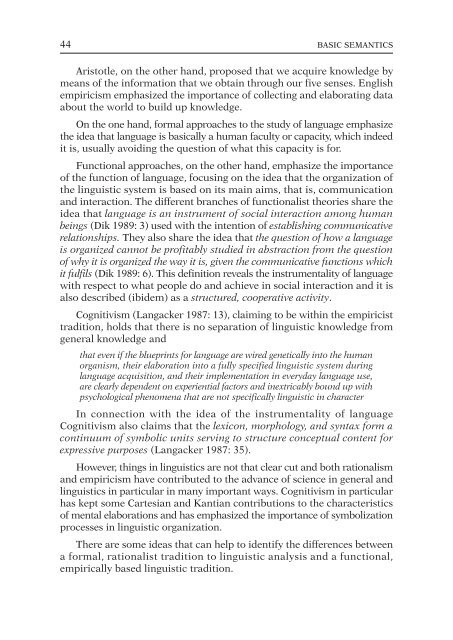Semantics
Create successful ePaper yourself
Turn your PDF publications into a flip-book with our unique Google optimized e-Paper software.
44 BASIC SEMANTICS<br />
Aristotle, on the other hand, proposed that we acquire knowledge by<br />
means of the information that we obtain through our five senses. English<br />
empiricism emphasized the importance of collecting and elaborating data<br />
about the world to build up knowledge.<br />
On the one hand, formal approaches to the study of language emphasize<br />
the idea that language is basically a human faculty or capacity, which indeed<br />
it is, usually avoiding the question of what this capacity is for.<br />
Functional approaches, on the other hand, emphasize the importance<br />
of the function of language, focusing on the idea that the organization of<br />
the linguistic system is based on its main aims, that is, communication<br />
and interaction. The different branches of functionalist theories share the<br />
idea that language is an instrument of social interaction among human<br />
beings (Dik 1989: 3) used with the intention of establishing communicative<br />
relationships. They also share the idea that the question of how a language<br />
is organized cannot be profitably studied in abstraction from the question<br />
of why it is organized the way it is, given the communicative functions which<br />
it fulfils (Dik 1989: 6). This definition reveals the instrumentality of language<br />
with respect to what people do and achieve in social interaction and it is<br />
also described (ibidem) as a structured, cooperative activity.<br />
Cognitivism (Langacker 1987: 13), claiming to be within the empiricist<br />
tradition, holds that there is no separation of linguistic knowledge from<br />
general knowledge and<br />
that even if the blueprints for language are wired genetically into the human<br />
organism, their elaboration into a fully specified linguistic system during<br />
language acquisition, and their implementation in everyday language use,<br />
are clearly dependent on experiential factors and inextricably bound up with<br />
psychological phenomena that are not specifically linguistic in character<br />
In connection with the idea of the instrumentality of language<br />
Cognitivism also claims that the lexicon, morphology, and syntax form a<br />
continuum of symbolic units serving to structure conceptual content for<br />
expressive purposes (Langacker 1987: 35).<br />
However, things in linguistics are not that clear cut and both rationalism<br />
and empiricism have contributed to the advance of science in general and<br />
linguistics in particular in many important ways. Cognitivism in particular<br />
has kept some Cartesian and Kantian contributions to the characteristics<br />
of mental elaborations and has emphasized the importance of symbolization<br />
processes in linguistic organization.<br />
There are some ideas that can help to identify the differences between<br />
a formal, rationalist tradition to linguistic analysis and a functional,<br />
empirically based linguistic tradition.



